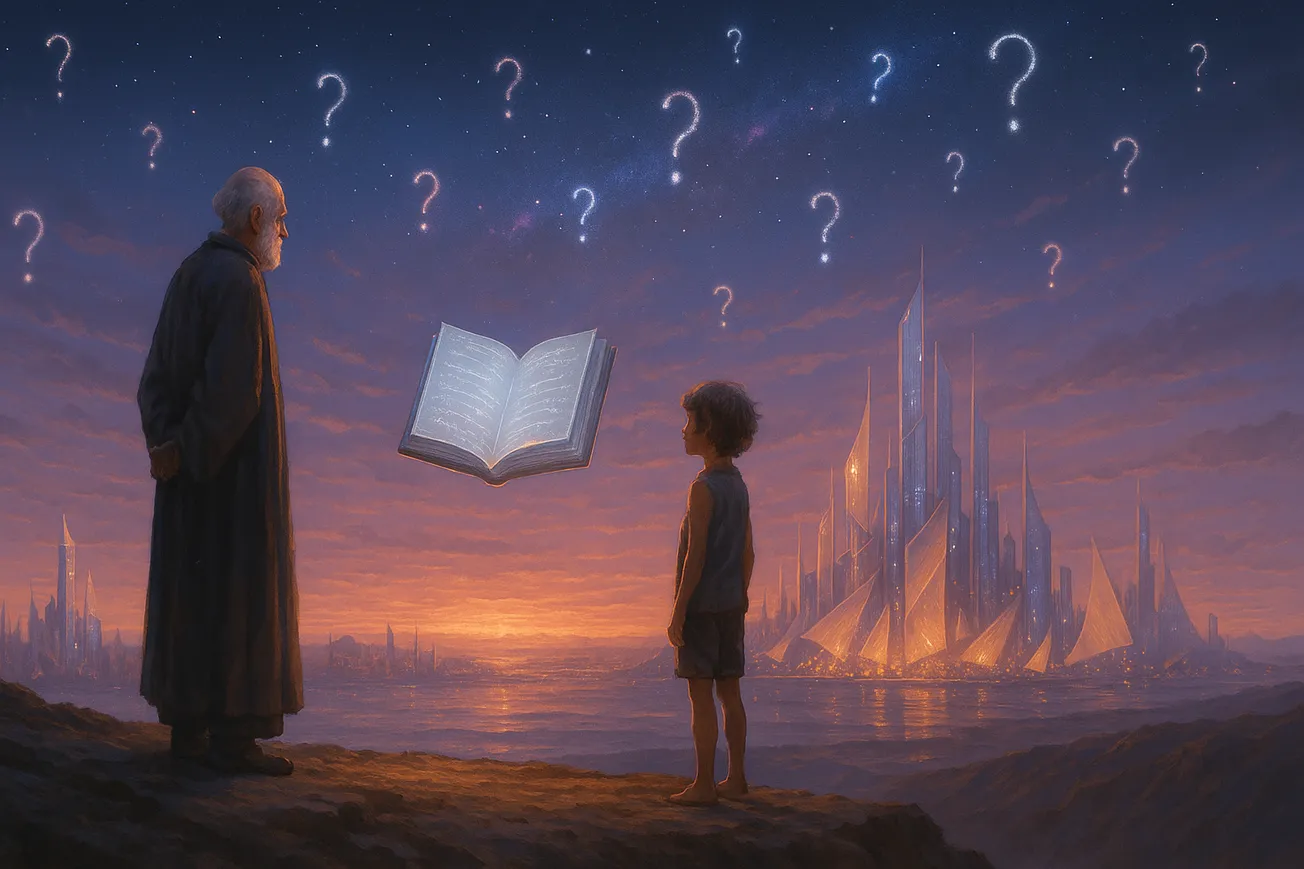🌈 The Fractal Story Engine | Society & Future | (20) SF-004-S
In the city of Thale, words were weighed, and questions were counted.
A child’s first breath earned them a book of parchment bound in quartzskin, thin as memory and unmarked. Upon their third sunrise, a silver-robed clerk from the House of Inquiry would press a single drop of moon ink to the center of the cover. From that moment, the book would record every question the child ever asked.
When the final page turned, and the hundredth question bled itself into ink, their voice would remain but never again form a query. Curiosity would become memory. Wonder would take root in silence.
There were no second books.
The old philosophers argued over the origin of the Rule. Some claimed it was a covenant with the gods. Others believed it was the echo of a bargain made by a dying star. But none disputed the outcome. The people of Thale had become careful with their tongues. Conversations slowed. Eyes studied more. Children were taught the difference between statements in disguise and true inquiries of the soul.
A question in Thale was not just for answers. It was an offering.
Iven was a glassblower’s son. By age seven, he had asked only four questions. His mother called him wise. His father called him cautious. But Iven knew the truth: each question made the world more fragile. He had watched a girl waste seventeen questions before she turned six, asking whether cats could dream or whether thunder had bones. She laughed easily and wept often. By ten, she had reached seventy. By twelve, she stopped speaking altogether. Iven watched, and waited, and saved.
His fifth question came on his sixteenth birthday. He held the unlit wick of his candle between thumb and forefinger and turned to his mother. “When you first held me,” he asked, “what did you feel?”
She did not answer right away. Her lips quivered, then steadied. “I felt,” she said, “that the world had folded to make room for you. That everything before was preparation.”
His parchment glowed faintly that night.
By twenty, Iven had asked only twelve questions. He traveled alone through the Dustwind Expanse. He learned to barter in gestures. He spent weeks in the Hall of Listening, where monks taught the art of hearing beneath words. He watched the dying ask their final questions with eyes wet and wide. Some asked what came next. Some asked if they had been loved. A few asked nothing at all.
At twenty-five, Iven asked his thirteenth. The woman’s name was Kesh. She had skin like river stone and a gaze that pried open dreams. They walked together through the city’s Nightmarket, saying little. Beneath the lanterns, he took her hand.
“Do you believe two souls can become one?”
She smiled without speaking, and kissed him with her whole life.
They married that winter beneath the silver trees.
Years passed. Iven asked carefully. Thirty-five questions remained when his daughter was born. He gave her his silence, taught her to count clouds, to name shadows, to taste rain. She asked freely, wildly, beautifully. At five, she had already used fifty. He wept once, alone, joyful and afraid.
When the illness came, it arrived like rust on a mirror. Kesh’s voice grew thin. Her laughter cracked. The doctors could not name the affliction, nor soothe it. Iven sat beside her and asked his sixty-ninth question.
“How can I stay with you when the river calls your name?”
She opened her eyes with effort, and whispered, “Stay behind. Become the question.”
That night, Iven spoke nothing.
She died with three questions left. He buried her with her parchment beneath a stone carved with one word: Still.
When he was old, and the city had changed its skyline with spires of mirror and smoke, Iven walked alone to the Mouth of the Sky, a cliff where the wind asked what it meant to fall. There, he opened his book. Ninety-nine questions. One remained. He had saved it. For what, he wasn’t sure. For something sacred. For something final.
He stood for hours, the question unformed, humming inside his bones.
A child approached. A stranger. Barefoot, eyes like soil after rain.
The child looked up.
“Do you know,” they asked, “why the stars flicker?”
Iven smiled. “No.”
And then he asked:
“Would you walk with me awhile?”
The wind carried the question upward.
The page turned. The book closed.
He never asked another.
But everything after was an answer.

